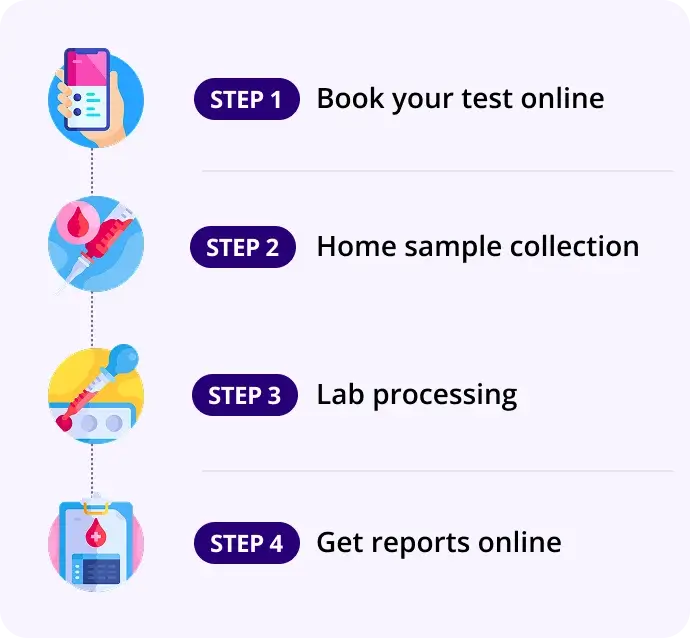Search for
Lactate Dehydrogenase (LDH Serum)
Liver
Report in 4Hrs
At Home
No Fasting Required
Details
The LDH test measures the amount of this enzyme in the blood, which rises when there is tissue damage or cell death
₹99₹363
73% OFF
FREE:
Ai Insights
Lactate Dehydrogenase (LDH Serum) - Comprehensive Test Guide
- Why is it done?
- Test Purpose: LDH is an enzyme found in nearly all body tissues. The test measures the level of lactate dehydrogenase in the blood to detect tissue damage and assess organ function.
- Primary Indications: Detection of myocardial infarction (heart attack), hepatic disease, hemolytic anemia, renal infarction, muscular dystrophy, and various malignancies
- Common Reasons for Testing: Chest pain evaluation, suspected liver disease, unexplained anemia, abnormal CBC results, assessment of muscle disorders, cancer screening or monitoring, and evaluation of fever of unknown origin
- Typical Timing: Often performed as part of initial emergency evaluation in acute settings, routine physical examination, follow-up testing within 24-72 hours of acute cardiac events, and periodic monitoring for chronic conditions
- Normal Range
- Reference Values: 140-280 IU/L (International Units per Liter) or 140-280 U/L. Some laboratories may report 0.47-0.94 µkat/L. Reference ranges vary slightly by laboratory and testing method.
- Units of Measurement: IU/L (International Units per Liter), U/L (Units per Liter), or µkat/L (microkatal per Liter)
- Interpretation of Results: Results within reference range indicate normal enzyme levels and typically suggest absence of significant tissue damage or organ dysfunction
- Elevated Results (High LDH): >280 IU/L indicates tissue damage or cellular injury. Mild elevation may suggest minor tissue damage, while markedly elevated levels (>500 IU/L) often indicate significant organ damage or acute conditions
- Low Results (Low LDH): <140 IU/L is less clinically significant but may indicate vitamin B6 deficiency or other rare conditions
- Interpretation
- Clinical Significance of Elevated Results: Elevated LDH suggests tissue damage but is not organ-specific. Results must be interpreted with clinical presentation, symptoms, and other test results (troponin for cardiac, ALT/AST for liver, creatinine for kidney damage).
- LDH Isoenzymes: LDH has 5 isoenzymes (LD1-LD5). LD1 and LD2 are heart-predominant; LD3 is in lungs; LD4 and LD5 are in kidneys, placenta, and liver. The LD1/LD2 ratio >1 (flipped pattern) suggests cardiac infarction within 48 hours.
- Acute Myocardial Infarction (MI): LDH rises 24-48 hours after MI and peaks at 3-10 days. Useful when troponin is not available or for diagnosing old MIs. Peak elevation often >500 IU/L.
- Hepatic Disease: Elevated LDH with elevated ALT/AST suggests liver damage. Marked elevation (>1000 IU/L) may indicate acute hepatitis or severe cirrhosis.
- Hemolytic Anemia: High LDH with low haptoglobin, elevated bilirubin, and reticulocytosis indicates red blood cell destruction.
- Malignancy: Elevated LDH is nonspecific marker for various cancers including lymphoma, leukemia, and solid tumors. Often correlates with tumor burden and prognosis.
- Muscular and Renal Disorders: Elevated LDH may indicate muscle damage (trauma, muscular dystrophy) or kidney infarction.
- Factors Affecting Results: Hemolysis (red blood cell breakdown during collection), pregnancy, intense physical exercise, myocardial infarction, pulmonary embolism, seizures, shock, liver disease, renal infarction, and certain medications can all elevate LDH.
- Serial Measurements: Trending LDH levels over time is more clinically useful than a single measurement. Rising levels suggest ongoing tissue damage; falling levels may indicate resolution or clinical improvement.
- Associated Organs
- Primary Organ Systems: Heart, liver, kidney, muscles, bone marrow, red blood cells, lungs, and brain (virtually all tissues contain LDH)
- Cardiac Conditions: Myocardial infarction, myocarditis, pericarditis, congestive heart failure, cardiac arrhythmias, coronary artery disease, and cardiac trauma
- Hepatic Conditions: Acute hepatitis, cirrhosis, fatty liver disease, alcoholic liver disease, hepatic necrosis, and liver cancer
- Hematologic Conditions: Hemolytic anemia, pernicious anemia, sickle cell disease, leukemia, lymphoma, multiple myeloma, and thrombotic thrombocytopenic purpura (TTP)
- Renal Conditions: Acute kidney injury, renal infarction, uremia, glomerulonephritis, and pyelonephritis
- Musculoskeletal Conditions: Rhabdomyolysis, muscular dystrophy, dermatomyositis, polymyositis, muscle trauma, and compartment syndrome
- Pulmonary Conditions: Pulmonary embolism, acute respiratory distress syndrome (ARDS), pneumonia, and pulmonary infarction
- Malignant Neoplasms: Hodgkin lymphoma, non-Hodgkin lymphoma, acute leukemia, chronic leukemia, testicular cancer, ovarian cancer, and various solid organ tumors
- Other Serious Conditions: Sepsis, shock, hyperthermia, carbon monoxide poisoning, convulsions, placental abnormalities in pregnancy, and tissue trauma
- Potential Complications: Abnormal LDH itself does not cause complications; however, the underlying conditions causing elevation may lead to organ damage, functional impairment, infection, organ failure, and without treatment, potentially life-threatening complications.
- Follow-up Tests
- Cardiac Evaluation: Troponin (high-sensitivity troponin I or T), CK-MB, electrocardiogram (ECG), echocardiogram, and cardiac stress testing when MI is suspected
- Hepatic Function Assessment: AST, ALT, alkaline phosphatase, bilirubin (total and direct), prothrombin time (PT/INR), albumin, and viral hepatitis serology when liver disease is suspected
- Hemolytic Anemia Workup: Complete blood count (CBC), reticulocyte count, haptoglobin, indirect bilirubin, peripheral blood smear, and direct antiglobulin test (Coombs test)
- Renal Function Assessment: Creatinine, blood urea nitrogen (BUN), glomerular filtration rate (GFR), urinalysis, and imaging (CT scan, ultrasound) for suspected renal pathology
- Muscle Injury Assessment: Creatine kinase (CK), myoglobin, electrolytes, and urinalysis when rhabdomyolysis is suspected
- Malignancy Workup: CBC with differential, bone marrow biopsy, flow cytometry, imaging studies (CT, PET-CT), and tumor-specific markers based on suspected malignancy type
- LDH Isoenzyme Fractionation: Measurement of LD1-LD5 fractions to determine which tissue is primarily affected. May be ordered when total LDH is elevated but diagnosis is unclear.
- Monitoring Frequency: Serial LDH measurements every 24-48 hours in acute settings (MI, hepatitis); weekly to monthly for chronic conditions (cancer, liver disease); timing depends on clinical presentation and treatment response
- Complementary Tests: Comprehensive metabolic panel, complete blood count, liver function tests, cardiac enzymes, coagulation studies, and imaging studies as clinically indicated
- Fasting Required?
- Fasting Requirement: NO - Fasting is NOT required for serum LDH testing
- Patient Preparation: May be drawn anytime of day. However, blood should be drawn in the morning when possible for consistency. Patient should rest for at least 5-10 minutes before blood draw if possible. Avoid strenuous exercise for 24 hours prior to testing as it can elevate LDH.
- Medications: Continue regular medications as prescribed unless specifically instructed otherwise by physician. Certain medications (anesthetics, some chemotherapy agents) may affect LDH levels; discuss with healthcare provider.
- Special Instructions: Inform healthcare provider of any recent trauma, muscle injury, alcohol consumption, or intense physical activity. In emergency settings, test can be performed immediately without preparation. Hemolysis during blood collection can falsely elevate results, so gentle collection technique is important.
- Sample Collection: Blood is collected by venipuncture into a serum separator tube (SST). Tube is typically left at room temperature for 30 minutes to allow clotting, then centrifuged. Serum is separated and sent to laboratory for analysis.
- Sample Stability: Serum samples are stable for 2-7 days at 2-8°C (refrigerated). If delayed testing is anticipated, samples should be refrigerated immediately after collection. Frozen samples remain stable for extended periods.
How our test process works!

